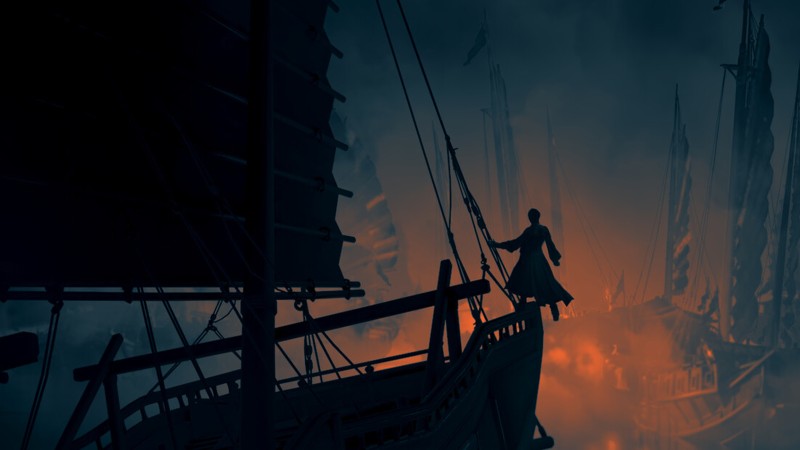When you think of pirates, history mainstays like Blackbeard might come to mind alongside the fictional Jack Sparrow. An important but often forgotten name, however, is Cheng Shih. Not only is Cheng Shih one of history’s most successful pirates, but she’s also the woman who took over her late husband Zheng Yi Sao’s pirate armada after his death, putting her in indirect control of 40,000-plus pirates for a nearly decade-long stint in Chinese waters in the early 19th Century. While Shih’s story can be found on pages of books and elsewhere, Singer Studios aims to bring her story to life in VR.

Taking place across a single night – the night Shih came to power, paving the way for her to create a code of laws for men and women to be treated equally on her ships – The Pirate Queen: A Forgotten Legend puts players in the shoes, errr boots, of Shih in PC VR devices and Meta Quest 2 next year. During a private game demo, I get a taste of this VR experience, which goes the escape room-esque route of VR gaming rather than the guns-blazing, setpiece-heavy one. Its quiet and methodical approach to gameplay is enticing, even without being in a headset to experience it myself. I’m especially interested in the team’s focus on Shih’s story and setting this VR game within a single night in her life. I’m told not to expect massive, pirate-filled battles but instead the emotional intensity Shih might have experienced that night.
“We come from film, so VR is a nice stepping stone for us,” Singer Studios CEO and creative director Eloise Singer tells me. “Each level has an escape room aspect; we wanted to lean away from being a shooter or combat game, challenging you to be as smart as she was, using her intellect to outsmart everyone.”
That intellect and the fact that Shih’s story is largely unheard of in the world of piracy attracted Singer and Singer Studios to the idea of The Pirate Queen. This story is one Singer has been thinking about for six years.
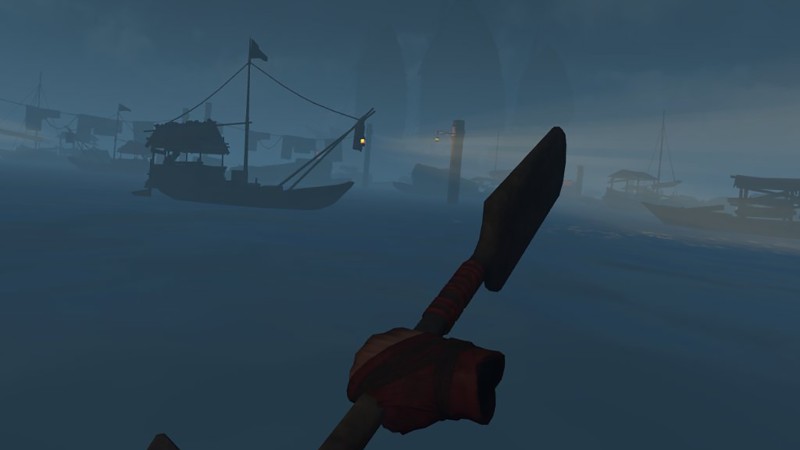
Singer Studios released The Last Rifleman, starring Pierce Brosnan (007 Tomorrow Never Dies, Mamma Mia) just last month, and Rare Beasts, starring Billie Piper (Doctor Who, Penny Dreadful) and Lily James (Cinderella, Baby Driver) in 2021. It’s worked with companies like Amazon on projects and others, too. The Pirate Queen began its life at Singer Studios as a film idea, but after meeting with now-former PlayStation London Studio boss David Ranyard, that changed.
“He was like, ‘This would make an amazing game,'” Singer says. Notably, PlayStation London Studio is the team behind PlayStation’s VR Worlds and Blood & Truth on VR – it’s easy to see how The Pirate Queen became a VR game. But Singer says she never imagined trying to make a game, shelving the idea for a bit. After the pandemic hit, though, at a time when movie productions worldwide came to a halt, Singer called Ranyard and said she wanted to turn The Pirate Queen into a game. The team got funding to create a prototype, grew to include additional staff, and won awards, including “Best Debut” at the Raindance Film Festival.
From there, Singer Studios showed the prototype, which I’m told was a single-room experience with light puzzle elements, to Meta. The company loved it and, on the first call, told the studio it wanted to make it a full project. The Pirate Queen will debut on Meta Quest 2 and other PC VR devices next year, more than four years after its development began.
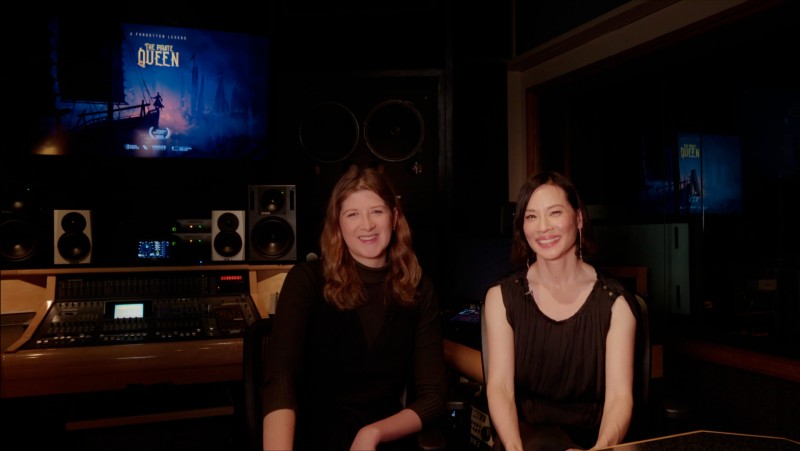
Creative director Eloise Singer and lead actress Lucy Liu
When I ask Singer why The Pirate Queen needed to be a VR experience, her answer is simple: “I’ve always wanted to be a pirate.”
“So selfishly, I’m just like, ‘I want to make a pirate game because I get to be a pirate,’ and it feels like our whole team is like that,” she adds. “But I think at the same time, when I first heard her story, it was one of those, ‘I’m so shocked that I didn’t know about this piece of history,’ and I just felt really compelled that everyone should know more about this period of history and how important this woman was. And it’s not even just the fact that she was a pirate, but she was the most powerful pirate of all time actually, and quite literally paved the way for equality.
“The more I looked into it, the more I was interested in this story, and I just felt it could make an amazing game. I really wanted to tell it, and I think when you feel there’s a fundamental belief for you wanting to tell the story, that’s kind of your driving force for wanting to create anything.”
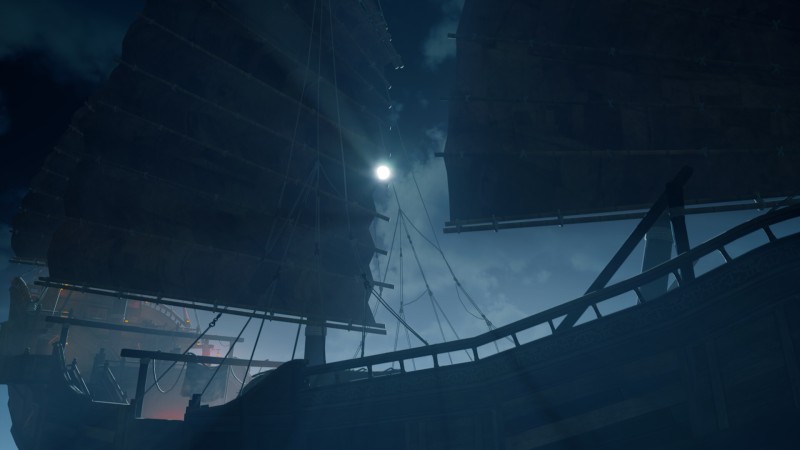
Singer says initially, her target audience for The Pirate Queen was women, perhaps in the bracket of 16 to 35 years old. But as more and more people played and tested the game, that age gap widened from smaller children to the elderly, and the gender disappeared. “It’s for everyone,” she says. “It’s a really beautiful project because it feels very inclusive in that sense.”
On a similar note, Singer tells me the team has taken a lot of time to ensure it’s as culturally sensitive and accurate as possible, learning about Chinese culture, 19th-century China, consulting and working with people of Chinese heritage, and more. Working with Chinese experts is why The Pirate Queen features properly displayed red lacquered wood aboard ships, era-specific art, time period-accurate calligraphy, and properly woven mats on ship floors.
Lead artist Will Brosch describes The Pirate Queen as a brains-over-brawns experience. “You are outmaneuvering your opponents in a diplomatic sense, but that doesn’t mean you don’t get your hands dirty in other ways,” he says.
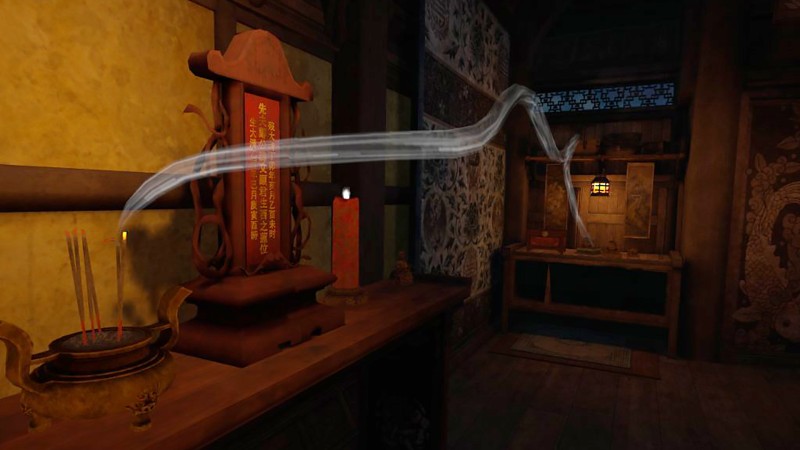
That’s clear from the 20-minute demo I watched. There aren’t swords clashing and gunpowder explosives lighting the horizon – Brosch says there isn’t any hand-to-hand combat in the game, although he does tease the use of cannons – but instead, bite-sized puzzles to solve. One example is a door with a lock in the captain’s cabin aboard the ship that used to be Sao’s. Various symbols mark the lock, and after throwing some rocks at some pottery on top of a cabinet, the player discovers more symbols on the wall. They line up the symbols on the lock with those on the wall to open it and move through the door.
“There’s a lot of cognitive puzzle stuff,” Brosch explains. “The script is quite narrative, linking back to our film background, and it’s about finding gameplay that fits within the script.”
This highlights Singer Studio’s story-first approach to The Pirate Queen, which is vital because Shih’s story is important to tell in a landscape drenched with male-driven piracy, be it games, movies, TV shows, or books. Singer tells me that approach helped the team land actress Lucy Liu (Kill Bill: Volume 1, Charlie‘s Angels) as an executive producer and the voice of the titular pirate queen.
“After we got accepted into [the Tribeca Film Festival], we reached out to her team and said, “We’re developing this project, and it’s really exciting. Is it something that she would be interested in coming on board with?'” Singer says. “And her team responded really warmly to the project and said, ‘This story is incredible.'”
Singer says it’s not a story Liu knew about, and she couldn’t believe it was real. Now, she’s the voice of Shih and is on board to presumably help the team flesh out this universe. The Pirate Queen VR game is just the start. There are plans for a movie next in the vein of a biopic, a graphic novel, a podcast, and a TV series with Beijing, China-based studio Seesaw Films, which is behind 2019’s The Farewell starring Awkwafina (Crazy Rich Asians, Shang-Chi).
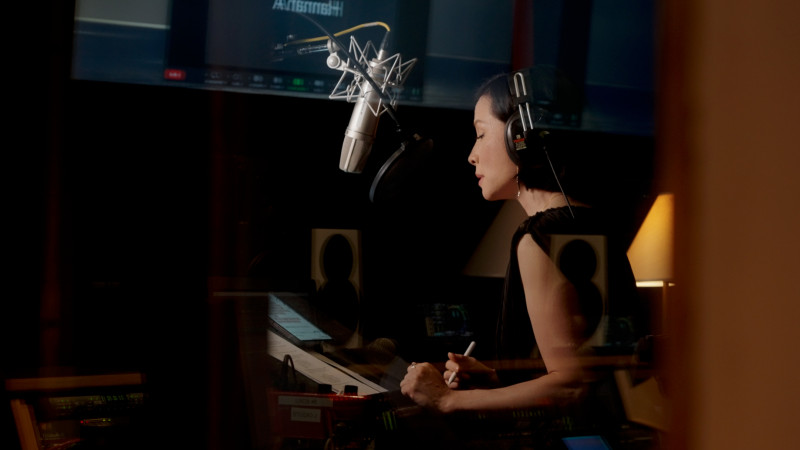
Lucy Liu recording VO for the game
“I think it reflects the studio and our values and foundations, which is that we are transmedia,” Singer says. “The whole idea is that we want to tell stories to different audiences on different platforms.”
On the differences between VR production and moviemaking, immersive producer Siobhan McDonnell says the biggest contrast comes in autonomy. “Where do you want your constraints?” she asks. “The autonomy of the player is about the illusion that you can go wherever you want in this story world, but actually, in terms of design, you do want the player to do certain objectives. It’s this beautiful fusion of, ‘Go explore and be free, but we kind of want you to do this part of the game.’ And I think mixing those two things can be challenging because you need it to be covert.”
McDonnell and Brosch mention bread crumbs as a way to do that – shining glints on required objects, lighting cues, sounds, and in-world narration from Shih are all ways to guide the player toward the golden path. Brosch adds that players are more prone to getting overwhelmed in VR than in other games and that in VR development, it’s crucial to find ways to prevent this, lest you risk losing the player. Singer says testing has helped the team a lot in this regard, and it’s a facet of game development she’s excited to bring into the studio’s moviemaking.
Testing has helped the team fight against the potential motion sickness that comes with every VR project. Programmer Hankun Yu says he never gets motion sickness in VR, but in a now-cut segment of the game where players swung on a rope to go from one ship to the next, he had reached “6-out-of-10” sickness. With the problem of motion sickness in The Pirate Queen solved – I have to take the team’s word for it until I can play it myself – Yu is excited for people to one day connect this historical story to something he tangibly worked on.
With that release arriving early next year, the team is excited for it to get into players’ hands.
“As an artist, I always hope that the player, especially in VR, takes the headset off and realizes that they forgot where they were, and that they were totally immersed in the world,” Brosch says. McDonnell tells me she just wants players to feel like badasses.
I enjoy the demo I’m shown of The Pirate Queen, and I enjoy speaking to the team behind it just as much. Singer, Brosch, and the others I talk to are passionate about Shih’s story and bringing it to life respectably and excitingly through VR. It’s tough to say just how enjoyable it is to experience without going hands-on, but what I’ve seen and heard excites me to do so when it launches next year.
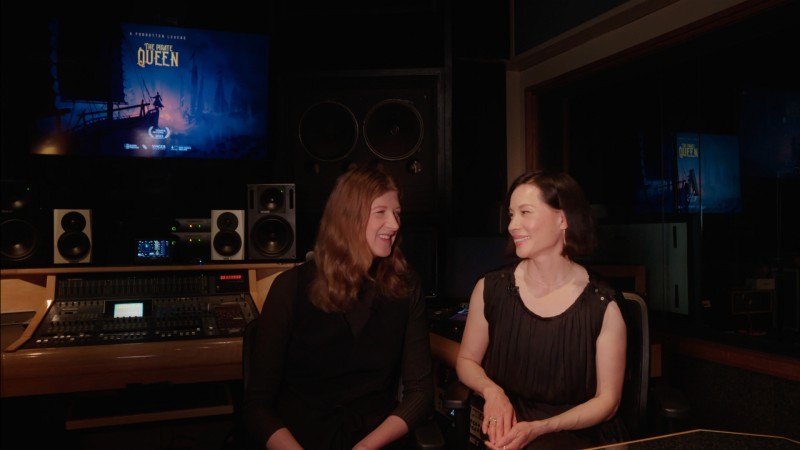
Creative director Eloise Singer and lead actress Lucy Liu
“For people to say, ‘I had no idea about that story, that was amazing, that was so much fun,’ that’s all I want,” Singer tells me. “We’re creating something to shed light on the history and a woman people don’t know about.”

